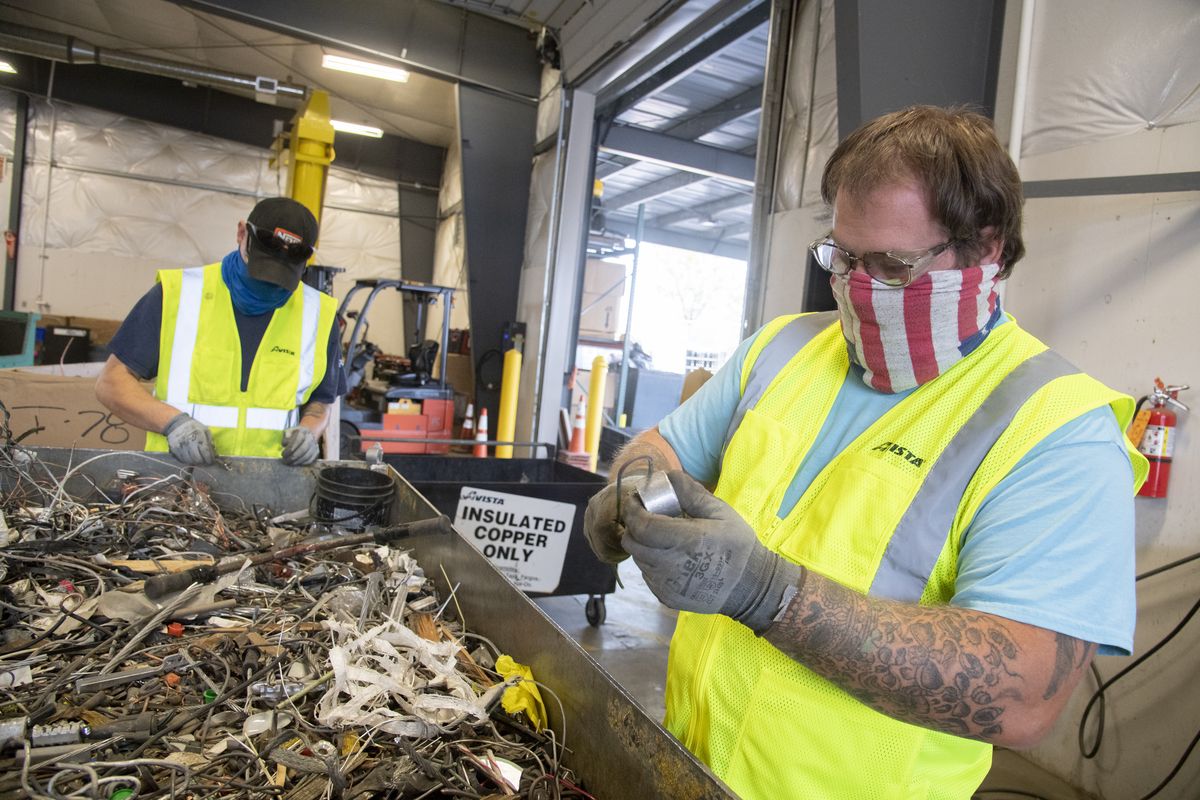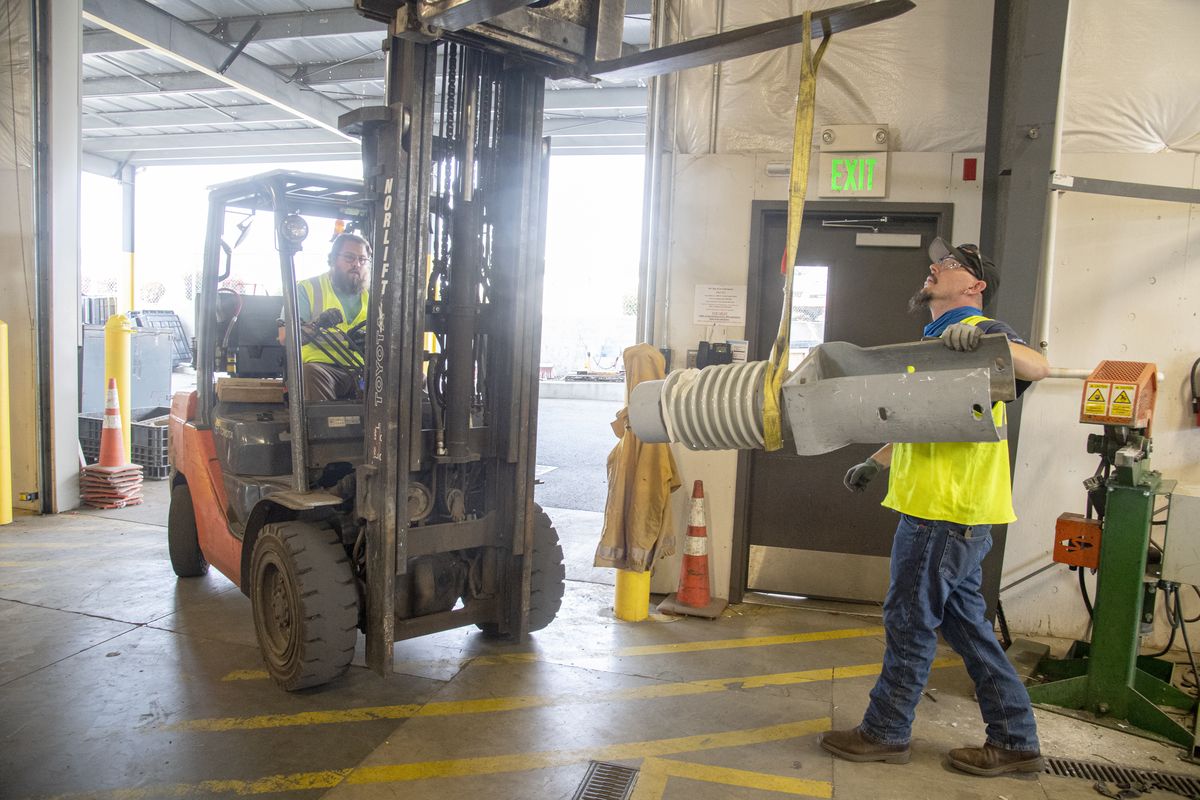Inclusivity pays off: Arc-Avista partnership hones skills of nine employees with disabilities

Malachi Chaney keeps an intense focus at the helm of a forklift using the equipment to haul a heavy insulator onto a recycling pallet.
Prior to six years ago, he struggled at another job because of disabilities – difficulties reading, writing and working in close quarters. Today, his boss describes Chaney as his top forklift operator, trusted all around Avista Utilities’ campus.
Chaney and eight co-workers in Avista’s Investment Recovery Center have differing intellectual and developmental disabilities. They’re employed by the Arc of Spokane in contract work for Avista to capture recyclable materials from damaged or replaced power poles. Most are longtime workers, including Chaney.
“Malachi has done nothing but thrive here, from somebody who was very timid to be on the forklift and unloading things to being my No. 1 guy around here and probably can drive circles around most forklift drivers,” said Dave Rogers, onsite manager for the Arc.
Sifting through piles, the crew identifies and separates pieces of copper, aluminum, iron and other recyclables. Their work returns about $432,000 annually to Avista from sold recycled materials. When also calculating the value of materials and recyclables reused by Avista, it saves the company more than $2.4 million a year.
The Arc-Avista partnership is 30 years old, Rogers said. “When we’re saving $2.4 million a year, a combination of stuff going back to the warehouse and in recycling, that’s huge. That’s already been paid for by the consumers and had been put out on the lines, so anything that comes back is a return for Avista customers.
“I’m so happy with what we’ve accomplished and to have the support from Avista. We’ve gotten these guys driver’s licenses, forklift certifications. I want the community to know this. I want them to see what our guys can do because it’s always what they can’t do.
“They’re treated the same as everybody else here. Groundsmen come in and ask for the guys, and it doesn’t matter that they have an I/DD. There’s inclusion.”

Part of a national network with 600 chapters, the Arc in Spokane provides advocacy, programs and services to people with intellectual and developmental disabilities so they can be fully engaged in their communities. It includes job support, mainly for people at individual workplaces.
Rogers said he and floor supervisor Todd Jensen, also with the Arc, serve “first and foremost” as job coaches for the nine workers. They’re trained in understanding I/DDs and in job support that considers various disabilities.
Chaney, 34, is among the site’s many success stories. He’s usually one of the first to arrive on the job at 7 a.m., and he never calls in sick.
“This is what I wake up and look forward to, coming here,” said Chaney, who lives in Airway Heights. “We have a good crew, good bosses, and we treat each other good. It’s just nice to wake up and be here with the guys.
“I support myself. I just always have enjoyed it here, ever since I started.”
Rogers, at the Avista site 25 years, said the employees are paid above minimum wage, and he’s watched each person grow in work and life skills. Worker James Cooper has 29 years of employment there, a milestone that drew congratulations in the past year from Avista CEO Dennis Vermillion, who Skyped with Cooper.
With an “impeccable” safety record, they’re trained on use of equipment and power tools, Rogers said. The crew can identify about 50 different types of wiring.
They use magnets stationed at bin corners to check wires. Clean copper – in abundance as an electrical conductor – returns the most money, but in large amounts, so do other materials such as iron and aluminum, Rogers added.
The crew also separates out the treated-wood portions of poles, usually at the ends, while cutting up the clean wood that can go back into the community.
“In the morning, the trucks drop off any material they’ve gotten through jobs, and it comes into these bins,” Rogers said. “We take these bins inside and roll them into a bigger tray or raisable table, and the guys sort the material out and break it out into their basic components. They break it down to its last possible pieces to claim as much as we can for Avista. These bins come in just a mess.
“We get torn pieces of wire, broken glass, everything you can imagine, fuses, bright and shiny copper, dirty copper, all-aluminum core, rubber-coated copper. The stuff that can’t be broken down any more we throw into a box ‘as-is,’ and we get a small amount of money for that.”
In sorting materials, the team must be focused, Rogers added, because if a bolt gets left in a copper load, it might fetch only an iron price. “They have to be completely clean, or we won’t capture the resources we need to from it.”
Three of the Arc employees are certified to drive forklifts after undergoing testing by Avista. Rogers said he insisted that the forklift certification tests be the same for his employees as they would be for other Avista operators. He was confident in their training and abilities.
“There were a few times in training, especially around the center of gravity on a forklift when you’re lifting things up, we had to explain it a little bit more simplified to the guys, but they got it,” he said. “We trust them completely on the forklift, and they’re all over the campus.”
Sometimes, Chaney does additional work that doesn’t involve a forklift or recycling, when he’s requested by Avista groundsmen to help load tree branches, lay sod or fix a sprinkler during repair jobs off campus, he said. Those other workers don’t run requests by Rogers or Jensen anymore but go directly to Chaney or his co-worker Scott Strickland. “The contract guys love us. We help them unload,” Rogers said.
He said Chaney in previous work at a home-improvement store had trouble loading a truck near closed-in spaces. Today, Chaney is comfortable loading in all situations.
“That’s why we have coaches here, that if they do have an issue, Todd and I are right here,” Rogers said. “Three or four of my guys I’ve gotten from individual employment. They couldn’t handle having a job on their own, but here, they succeeded. One guy couldn’t hold a job more than six months, and he’s been here six years now.
“It’s just getting over that fear and having the coaches right there. When you have a boss and you say, ‘I can’t do this,’ the boss doesn’t care. The boss wants it done, bottom line.”
But along with coaching, the group also gets the hard work done, he added. It shows, “What my guys can do and what they can learn if given the chance, and patience and time with them. No, it doesn’t take forever; Malachi’s my best guy, and he picked it up like that.”
It can be challenging at times, but it works. “I’ve got nine different guys with nine different diagnoses,” he said. “But this crew is like a family; they help each other.
“I want all my guys to feel happy and prideful in their jobs; that’s my job. I’ve watched every one of them grow, learn different skills, get married, get driver’s licenses, advance and carry on a normal life. That’s what it’s all about.”